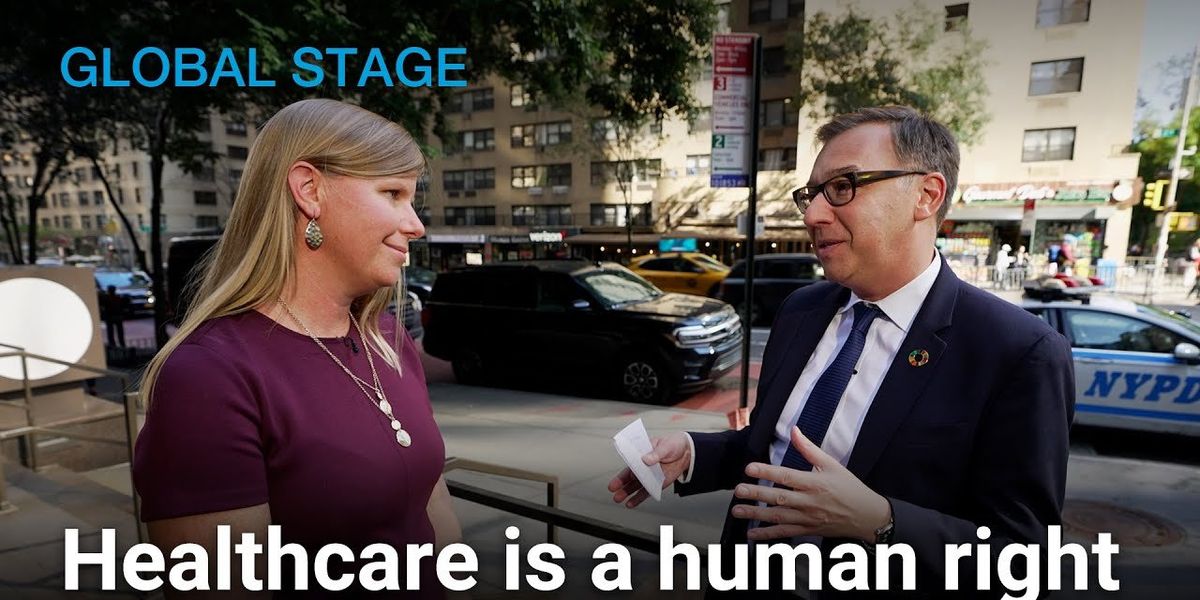Trending Now
We have updated our Privacy Policy and Terms of Use for Eurasia Group and its affiliates, including GZERO Media, to clarify the types of data we collect, how we collect it, how we use data and with whom we share data. By using our website you consent to our Terms and Conditions and Privacy Policy, including the transfer of your personal data to the United States from your country of residence, and our use of cookies described in our Cookie Policy.
{{ subpage.title }}
UN's Guy Ryder calls for inclusivity and collaboration to tackle global problems
In a Global Stage conversation from inside the United Nations headquarters during the 79th General Assembly, Guy Ryder, Under-Secretary-General of the United Nations, addressed the challenges of global collaboration in today’s divided world. Despite geopolitical tensions and ongoing conflicts, Ryder stressed that member states are committed to implementing the Pact for the Future, an inter-governmentally negotiated pact focused on tackling today's global issues to protect the needs and interests of future generations.
Speaking with GZERO’s Tony Maciulis, Ryder highlighted the importance of inclusivity in moving forward. "We need to work not for young people but with young people as well. Everybody's involved," he said. Ryder emphasized that collaboration across governments, the private sector, and civil society is critical, particularly in areas like technology and youth participation.
The discussion also touched on the UN’s role in AI governance, with Ryder noting that the UN remains the only place where all 193 member states have a seat at the table. He acknowledged the UN’s shortcomings but highlighted how UN successes are often invisible. "What about that war that never happened because of UN mediation?"
Mr. Ryder also reinforced that the UN is not above reform: "Let's not think that was put in place in 1945, and has served very well the international community for decades, is immutable, is perfect, cannot be improved."
On the topic of the Sustainable Development Goals (SDGs), Ryder remained optimistic, despite setbacks. “We were off track almost from the first day,” he said, adding that the world must continue pushing towards the 2030 goals. Ryder sees technology as a powerful tool for both skilling and education, critical for achieving the SDGs.
America Ferrera on Barbie's global impact and the power of storytelling
From the SDG Lounge inside the United Nations headquarters during the 79th General Assembly, America Ferrera reflected on the powerful impact of her monologue from the film Barbie, which captivated global audiences. Speaking with GZERO’s own Tony Maciulis during a broader discussion on the power of local and grassroots activism, Ferrera highlighted the unique ability of art to connect with people, contrasting it with political speeches, which can feel distant and agenda-driven. Ferrera emphasized that Barbie—despite being a film about a doll—sparked conversations on important themes like patriarchy and gender equality. With its widespread success, Ferrera believes the film demonstrated how storytelling can resonate across diverse audiences, fostering engagement and dialogue in ways that traditional approaches might not.
For more on GZERO's UNGA coverage, click here.
“Health is a human right”: How the world can make up progress lost to COVID
The state of public health in the developing world bears some deep scars from the COVID-19 pandemic. Over the past three years, immunization rates have dropped to levels not seen in three decades. 2 billion people are facing "catastrophic or impoverishing" health spending worldwide according to the World Health Organization. And governments in the Global South are taking on more and more debt at the expense of investment in health and social services.
Kate Dodson, the Vice President of Global Health Strategy at the UN Foundation, is on the frontlines of the fight to give the most vulnerable people in the world access to proper healthcare. She works to connect experts and innovators with the UN, and find resources to support their work.
She’s calling on governments to invest in basic elements of public health, including primary care access, and properly remunerating healthcare workers — the majority of whom are women, worldwide. And more fundamentally, she wants leaders to treat health as a human right that all deserve to enjoy.
More from Global Stage: https://www.gzeromedia.com/global-stage/
- Can surveillance prevent the next pandemic? ›
- Highlights from our live discussion on post-pandemic health security ›
- Eris on the rise ahead of predicted fall COVID wave ›
- China's COVID lockdowns made its people depressed and hurt its economy ›
- Ian Explains: Is the world better today thanks to human progress? - GZERO Media ›
- How can the world build back better public health after COVID? - GZERO Media ›
- Is life better than ever for the human race? - GZERO Media ›


